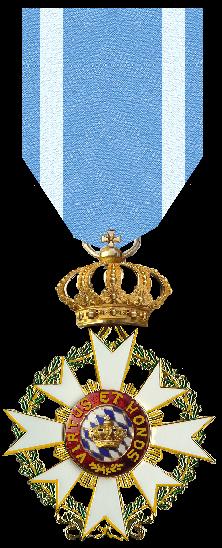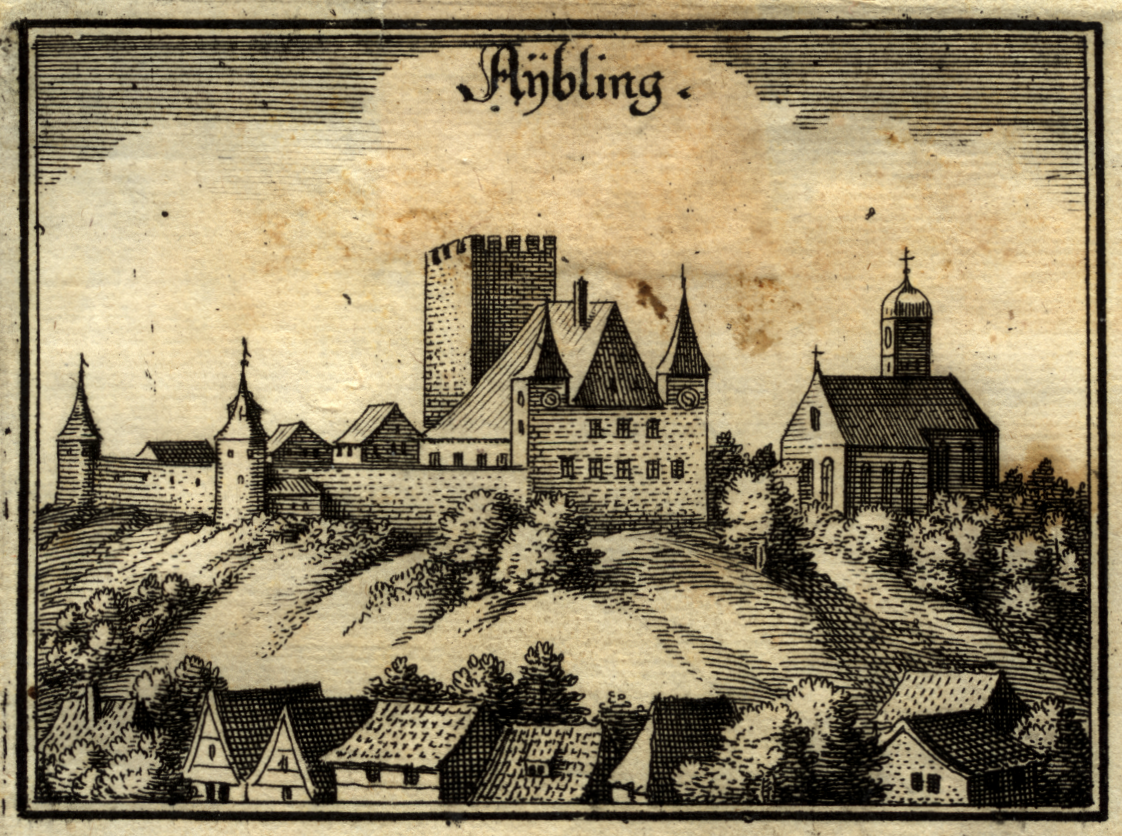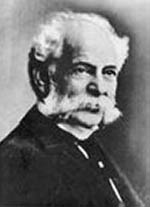|
Joseph Maximilian Von Maillinger
Joseph Maximilian Fridolin Ritter von Maillinger (4 October 1820 – 6 October 1901) was a Bavarian General der Infanterie and War Minister under Ludwig II of Bavaria. Biography Von Maillinger was born in Passau. After passing his company officer career, at last in the Generalquartiermeister staff in Munich, he was transferred to the General Command in Munich as major of the general staff. The first time, he served for the war ministry, he was ordered by Von Lüder. In 1863 he became head of department at the war ministry. Also he was adjutant of Eduard von Lutz, as well as representative of him at the Landtag. In 1865 he was advanced to Oberstleutnant, in 1866 he Oberst. Thenceforward he was commander of the 7th Royal Bavarian Infantry Regiment and deputy of Von Lutz. In 1869 he became major general and commander of the 8th Royal Bavarian Infantry Brigade. One year after that, he was advanced to lieutenant general, and led the 2nd Royal Bavarian Division during the ca ... [...More Info...] [...Related Items...] OR: [Wikipedia] [Google] [Baidu] |
Lieutenant General
Lieutenant general (Lt Gen, LTG and similar) is a three-star military rank (NATO code OF-8) used in many countries. The rank traces its origins to the Middle Ages, where the title of lieutenant general was held by the second-in-command on the battlefield, who was normally subordinate to a captain general. In modern armies, lieutenant general normally ranks immediately below general and above major general; it is equivalent to the navy rank of vice admiral, and in air forces with a separate rank structure, it is equivalent to air marshal. A lieutenant general commands an army corps, made up of typically three army divisions, and consisting of around 60 000 to 70 000 soldiers (U.S.). The seeming incongruity that a lieutenant general outranks a major general (whereas a major outranks a lieutenant) is due to the derivation of major general from sergeant major general, which was a rank subordinate to lieutenant general (as a lieutenant outranks a sergeant major). In contrast ... [...More Info...] [...Related Items...] OR: [Wikipedia] [Google] [Baidu] |
Order Of Merit Of The Bavarian Crown
The Order of Merit of the Bavarian Crown (german: Verdienstorden der Bayerischen Krone) was an order of merit of the Kingdom of Bavaria established by King Maximilian Joseph I on 19 March 1808. The motto of the order is Virtus et Honos ('Courage and Honour'). The order was awarded in several grades: * Grand Cross * Grand Commander * Commander * Knight * Medal in Gold * Medal in Silver History King Maximilian I Joseph, founded the order to reward civil servants of the state of all classes and other foreigners who were deserving of recognition of the Kingdom of Bavaria. It was created as a civil counterpart to the Military Order of Max Joseph. Both the orders brought non-noble recipients in the collection of personal nobility with the title " Ritter von". The Order of Merit of the Bavarian crown was initially founded with three grades Grand Cross, Commander, and Knight. King Maximilian II added the grade of Grand Commander in 1855. For each grade there was a fixed number of memb ... [...More Info...] [...Related Items...] OR: [Wikipedia] [Google] [Baidu] |
Military Order Of Max Joseph
The Military Order of Max Joseph (german: Militär-Max-Joseph-Orden) was the highest military order of the Kingdom of Bavaria. It was founded on 1 January 1806 by Maximilian I Joseph of Bavaria, the first king of Bavaria. The order came in three classes: * Grand Cross (''Großkreuz'') * Commander's Cross (Kommandeurkreuz'') * Knight's Cross (''Ritterkreuz''). Individuals who received the order and were not already members of the nobility were ennobled and would add the title of "Ritter von" to their family name. A Bavarian title of nobility obtained through the Military Order of Max Joseph was valid for the recipient's life only. The order became obsolete in 1918 with the collapse of the Bavarian monarchy on Germany's defeat in World War I. However, the orders chancery continued to process outstanding award recommendations to at least 1922. Description The ''badge'' of the order was a white-enameled gold Maltese cross with balls at each cross point. The center medall ... [...More Info...] [...Related Items...] OR: [Wikipedia] [Google] [Baidu] |
Order Of Saint Hubert
The Royal Order of Saint Hubert (german: Sankt Hubertus Königlicher Orden), or sometimes (german: Königlicher Orden des Heiligen Hubertus) is a Roman Catholic dynastic order of knighthood founded in 1444 or 1445 by Gerhard VII, Duke of Jülich-Berg. He sought to commemorate his victory over the House of Egmond at the Battle of Linnich on 3 November, which is Saint Hubert's day. The establishment of the Order occurred during a long-term, intermittent territorial dispute, initially between the Dukes of Jülich and the Dukes of Guelders, who were descended from a female line of the House of Jülich. The dispute began in the 1430s, when Arnold, Duke of Gelderland claimed the duchy of Jülich and the county of Ravensberg, and was resolved in the 1614 Treaty of Xanten, which established the United Duchies of Jülich-Cleves-Berg of the counties of Ravensberg and Mark with the duchies of Cleves, Jülich and Berg. In 1778, Charles Theodore, Duke of Jülich and Berg and the Count- ... [...More Info...] [...Related Items...] OR: [Wikipedia] [Google] [Baidu] |
Maillingerstraße (Munich U-Bahn)
Maillingerstraße is a street in the Munich districts of Maxvorstadt and Neuhausen. Running from north to south, it connects Nymphenburger Straße with Marsstraße. It is named after the Bavarian general and Minister of War Joseph Maximilian von Maillinger. The street has been named ''Maillingerstraße'' since 1886. Today Maillingerstraße is a traffic calmed secondary road. Historically Listed buildings In the street, house numbers 11-13 were formerly barrack buildings. At Maillingerstraße 11, a three-story extension was built in 1979 for the payment agency for Bavarian state employees. Since 1968, the offices of the Bavarian State Office of Criminal Investigation have been located on the street, on the site of the artillery barracks, in which a part of the listed former barracks building at Maillingerstraße 15 was integrated. This building and five other four- to five-storey apartment buildings in Maillingerstraße are historically listed buildings. They refer to * a f ... [...More Info...] [...Related Items...] OR: [Wikipedia] [Google] [Baidu] |
Bad Aibling
Bad Aibling () is a spa town and former district seat in Bavaria on the river Mangfall, located some southeast of Munich. It features a luxury health resort with a peat pulp bath and mineral spa. History Bad Aibling and its surroundings were settled by Celtic tribes from about 500BC until 15BC. After Roman occupation, it was finally settled by Bavarii tribes in the 5th century AD. In 804 Bad Aibling was mentioned for the first time as "Epininga". In mediaeval times, it was an administrative centre in the lordship of the Counts of Falkenstein. In 1166 it was mentionead in the Codex diplomaticus Falkensteinensis as "Aibilingen". After the obliteration of the Neuburg-Falkenstein dynasty, it became part of the realm of the Wittelsbach family. In 1845 the first treatments with peat pulp were offered by the physician Desiderius Beck. Bad Aibling received the title "Bad" (spa or springs) in 1895. In the year 1933, Bad Aibling officially became a town. After the Second Wor ... [...More Info...] [...Related Items...] OR: [Wikipedia] [Google] [Baidu] |
Reichsrat (Bavaria)
''Reichsrat'' is a legislative body in German-speaking countries similar to the Upper House of a Parliament. The cognate in Scandinavian countries is ''Riksråd''. These may refer to: * Reichsrat (Austria), the parliament of the Cisleithanian part of Austria-Hungary (1867–1918) * Reichsrat (Germany), a body representing the German States in the Weimar Republic (1919–1933) * Riksråd, various Royal Councils in Scandinavian countries * Riksrådet, the Privy Council of Sweden See also * Reichstag (other), the directly elected body or Lower House of parliaments in various German-speaking countries * Riksdag (other), the cognate of Reichstag in Scandinavian countries * Rigsdagen, Parliament of Denmark (1849–1953) * In modern Germany, the Bundestag The Bundestag (, "Federal Diet (assembly), Diet") is the German Federalism, federal parliament. It is the only federal representative body that is directly elected by the German people. It is comparable to the Uni ... [...More Info...] [...Related Items...] OR: [Wikipedia] [Google] [Baidu] |
Heinz Häfner
The H. J. Heinz Company is an American food processing company headquartered at One PPG Place in Pittsburgh, Pennsylvania. The company was founded by Henry J. Heinz in 1869. Heinz manufactures thousands of food products in plants on six continents, and markets these products in more than 200 countries and territories. The company claims to have 150 number-one or number-two brands worldwide. Heinz ranked first in ketchup in the US with a market share in excess of 50%; the Ore-Ida label held 46% of the frozen potato sector in 2003. Since 1896, the company has used its "57 Varieties" slogan; it was inspired by a sign advertising 21 styles of shoes, and Henry Heinz chose the number 57 even though the company manufactured more than 60 products at the time, because "5" was his lucky number and "7" was his wife's. In February 2013, Heinz agreed to be purchased by Berkshire Hathaway and the Brazilian investment firm 3G Capital for $23billion. On March 25, 2015, Kraft announced its ... [...More Info...] [...Related Items...] OR: [Wikipedia] [Google] [Baidu] |
Karl Philipp Von Wrede
Karl may refer to: People * Karl (given name), including a list of people and characters with the name * Karl der Große, commonly known in English as Charlemagne * Karl Marx, German philosopher and political writer * Karl of Austria, last Austrian Emperor * Karl (footballer) (born 1993), Karl Cachoeira Della Vedova Júnior, Brazilian footballer In myth * Karl (mythology), in Norse mythology, a son of Rig and considered the progenitor of peasants (churl) * ''Karl'', giant in Icelandic myth, associated with Drangey island Vehicles * Opel Karl, a car * ST ''Karl'', Swedish tugboat requisitioned during the Second World War as ST ''Empire Henchman'' Other uses * Karl, Germany, municipality in Rhineland-Palatinate, Germany * '' Karl-Gerät'', AKA Mörser Karl, 600mm German mortar used in the Second World War * KARL project, an open source knowledge management system * Korean Amateur Radio League, a national non-profit organization for amateur radio enthusiasts in South Korea ... [...More Info...] [...Related Items...] OR: [Wikipedia] [Google] [Baidu] |





